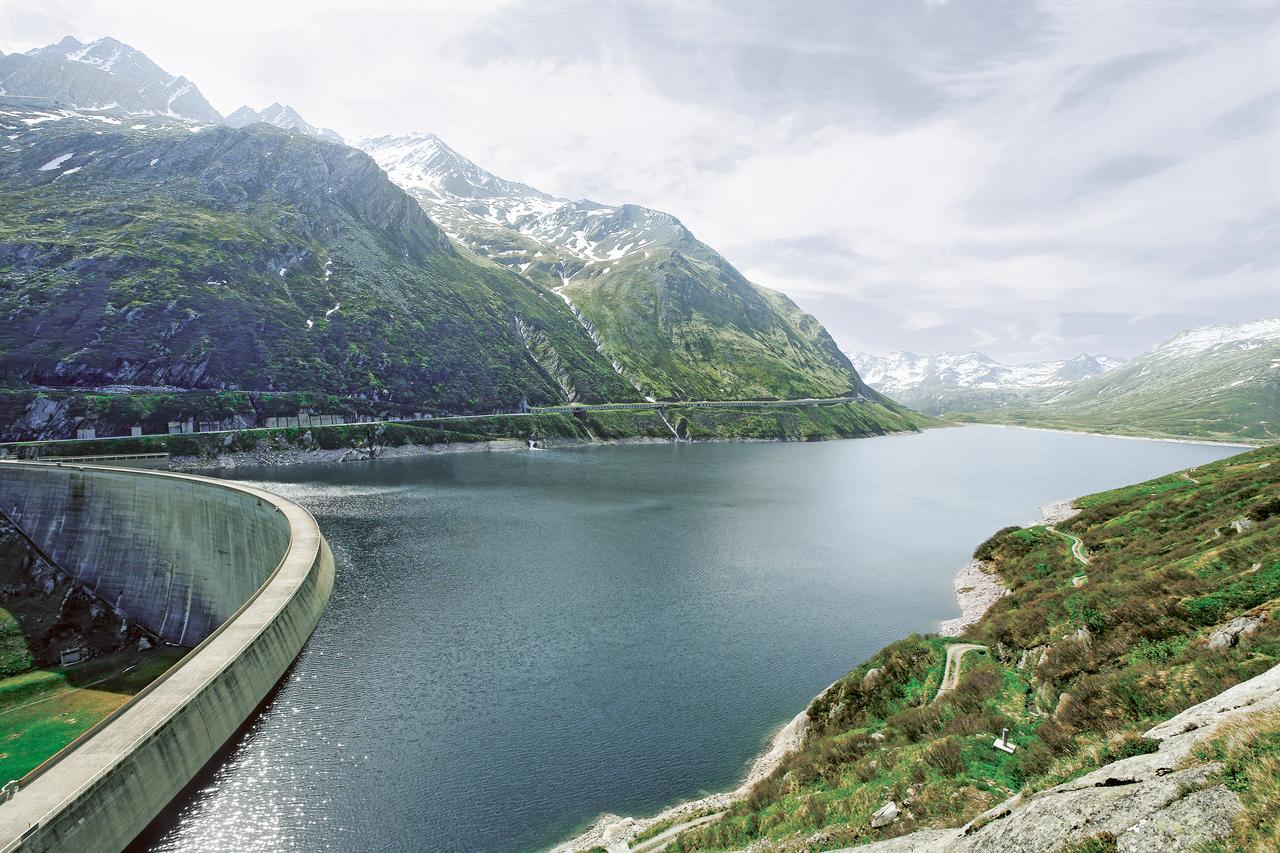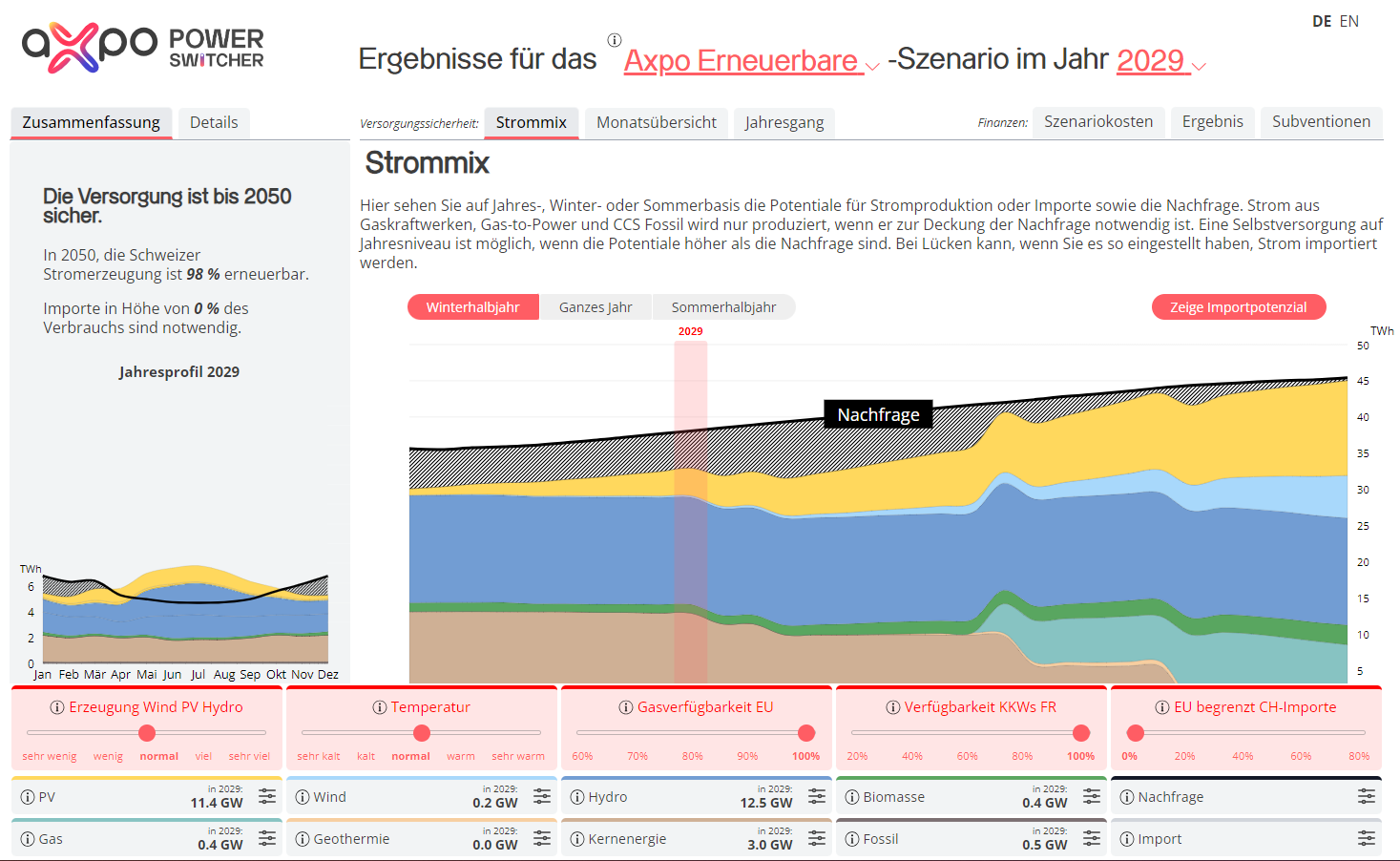27.05.2024 | 4 facts on a frequently asked question
Are energy suppliers allowed to invest in loss-making projects?
Enabling a sustainable future with innovative energy solutions. That is Axpo's ambition. Every day, almost 7000 employees work towards this goal and contribute, among other things, to Axpo being able to cover around 40% of Switzerland's electricity needs. Billions have been invested in existing and new plants in recent years. However, we often hear the question of why Axpo does not invest even more - for the good of Switzerland - even in loss-making projects. Here are four facts why this is not possible without further ado.
Axpo is wholly owned by the cantons and their electricity utilities. The term ‘state-owned company’, which is often used in common parlance, may therefore be superficially correct. However, in general terms, it leads people to believe that Axpo can also invest in loss-making projects in the interests of security of supply. Is this the case? In the following, we examine Axpo's position in the market from an economic and legal perspective and show where Axpo invests and why not every investment is possible, sensible or even legal.
Fact 1: Axpo has long since ceased to be part of a monopoly and bears the full market risk
The idea of an inter-cantonal interconnected electricity supply gained momentum shortly before the First World War. The political pressure to have the electricity supply in public hands increased and in 1914 the cantons of Aargau, Glarus, Zurich, Thurgau, Schaffhausen and Zug merged to form Nordostschweizerische Kraftwerke AG (NOK). But the days of the monopoly, regulated prices and guaranteed returns are long gone. In the 1990s, the European Union announced the liberalisation of the electricity market, and Switzerland followed suit in 2009 with partial liberalisation. Today's Axpo has become a company that is exposed to market mechanisms. Where previously the costs of electricity production were passed on 100% to monopoly customers regardless of the amount, Axpo now sells all the electricity it produces on the market. Nobody is forced to buy from Axpo. If the market price is below the production costs, Axpo would make a loss. The market price is set internationally and Axpo, like all producers on the market, simply takes the price that is offered. Axpo therefore earns every franc on the market in its core business (production and trading), with one exception: Axpo's Central Switzerland subsidiary CKW operates in the regulated end customer market. However, business with captive end customers in Central Switzerland accounts for only a very small part of Axpo's business activities. The economic conclusion is simple: investments must be earned first. This is not possible with loss-making activities. A company that operates uneconomically in the long term will sooner or later go bankrupt. For Axpo to continue to make its contribution to Switzerland's security of supply, it must remain capable of making investments. In addition, the capital market takes its cue from a company's rating. If this rating cannot be maintained (due to a lack of profitability or the quality of the balance sheet), a company will at best receive expensive debt capital and at worst none at all. Axpo is part of these market mechanisms.
Fact 2: Axpo is a public limited company and is therefore bound by the Swiss Code of Obligations
Public limited companies are corporations with a primarily commercial, i.e. profit-orientated, purpose. From a legal perspective, the Board of Directors of a public limited company may not make any investment decisions that it assumes or must assume will result in a loss. Cross-subsidising loss-making business with business of a different nature within the same company is not a business model that works in the long term and is contrary to the profit-oriented purpose laid down in the articles of association. Axpo has an owner's strategy and Articles of Association that both assume an economic purpose and require economic action. Axpo also has bonds outstanding on the capital market. Bond creditors also assume that the company has an economic purpose.
Fact 3: No disadvantages for the owner cantons and their populations
In economic terms, security of supply is a public good. And according to economic theory, markets fail when it comes to public goods. If Axpo were to finance loss-making electricity supply projects, the taxpayers of Axpo's owner cantons would ultimately pay for them. This would mean that the taxpayers of nine cantons would be cross-subsidising all electricity consumers throughout Switzerland - because no one can be excluded from the security of supply provided by Axpo's electricity. We must not expect the owners (i.e. the cantons, the power plants and ultimately the population) to bear losses in the millions, most of the benefits of which lie elsewhere than with the owner cantons.
Fact 4: Long project paths require resources - these resources must be used in a targeted manner
Economic viability plays a key role in the selection of new projects. The plants needed for Switzerland's energy transition require investments totalling billions and often have a horizon of decades. A good example is the project for the new Waldemme hydropower plant by Axpo subsidiary CKW. This plant supplies 1500 households with sustainable electricity and thus makes a small but important contribution to the security of supply with renewable energy. However, it took 19 years from the initial project idea to the ground-breaking ceremony in 2022. Such delays take up valuable time and money. The costs of a plant are already offset by the highly uncertain development of electricity prices. Electricity producers have no influence on this. It is set in Europe and is sometimes politically influenced. For these reasons, limited funds must be used wisely. A budgetary approach to investments is key and investments must be used in a very targeted manner. Axpo CEO Christoph Brand emphasised this issue some time ago in a guest article in the Tages-Anzeiger.
These facts illustrate the market environment in which Axpo operates. Targeted, sustainable and therefore - wherever possible - profitable investments are essential for the continued existence of the company. Only in this way can we continue our high level of investment in hydropower, nuclear power, Alpine PV plants, wind power and innovative energy sources such as hydrogen and thus make our contribution to long-term security of supply.




.jpg)





